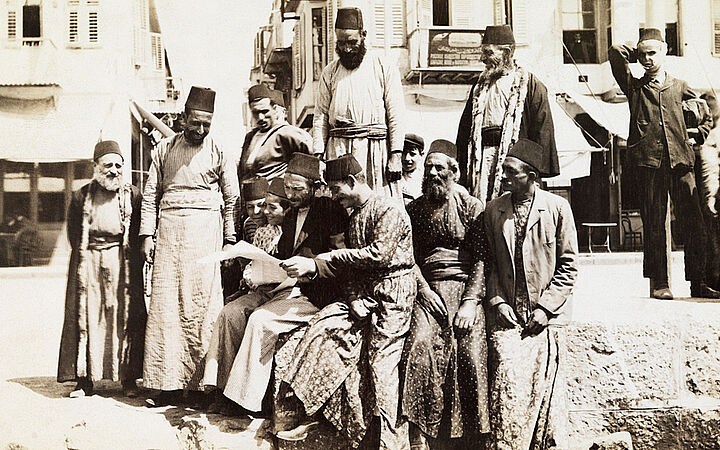Mittwoch, 17. M�rz 2021, 18:30 - 20:00 iCal
Ringvorlesung Turkologie Sommersemester 2021
„Happy Together”: The entangled history of Jewish communities in Ottoman lands and Turkey
Institut für Orientalistik
Vortrag
Shabbetay Ṣevi: The First Transgender Messiah Ever
Eliezer Papo (Be’er Scheva)
Abstract
Eschatological expectations and messianic hopes aroused by the expulsion of Jews from Spain climaxed in the seventeenth century with the appearance of Shabbetay Ṣevi. In 1666, Sultan Mehmed IV, eager to halt the uproar without creating a martyr, offered Ṣevi a choice between conversion to Islam and death. Ṣevi chose life. Although many Jews were devastated by his apostasy, a nucleus of Shabbetay’s most ardent followers preferred to understand it as the ultimate tiqqun. The lecture focuses on one of the most intriguing Sabbatian literary accounts of their Messiah’s apostasy: the internal Sabbatian version of the romansa “Tarquin and Lucretia”. The choice to represent metaphysical truths and concepts via a female genre (romansa) in a female tongue (Judeo‐Spanish) was not an invention of those Sabbatians who followed their Messiah in his apostasy. The first to do so was Shabbetay himself. ‘Meliselda’, a Spanish oicotype of ‘Melisenda Insomne’, a famous French ballad from Carolingian period, played a prominent role in Sabbatai’s own weltanschauung and he singled it out as the most central liturgical/metaphysical text of the movement, by performing it during his dramatic selfappointment as Messiah, in Izmir’s synagogue, in the year 1666. While Sabbatai consecrated “Meliselda” only by reinterpreting the traditional song, without introducing any changes in the text, the later Sabbatians were more liberal. They not only altered the accepted meaning of a given text, but often revised the text itself in order to make it a more fitting vehicle for their theological messages. Thus unique Sabbatian oikotypes of at least two additional romansas (besides the already mentioned: “Tarquin and Lucretia”) were created, namely the Sabbatian “Delgadina” and Sabbatian “San Juanada”. In each of the four Shabbetay is identified with the original main female character, in addition to the “strange usage” of a “female song”, sung in a “female language”. A careful reading of Shabbetay’s own, as well as of the literary and linguistic strategy of his Maminim/”Dönmeh” followers offers a rare glimpse into the transgender self‐consciousness of the Sabbatian Messiah and into Messiah’s identification as the embodiment of the Shekhinah (the “female Aspect of the Divinity”), amongst at least one of the Maminim/”Dönmeh” sects.
Bio
Dr. Eliezer Papo is senior lecturer at the Hebrew Literature Department at the Ben‐Gurion University of the Negev, a Chairman of the Moshe David Gaon Center for Ladino Culture at the same University and the chief‐editor of El Prezente – Journal for Sephardic Studies (scientific journal published by the Gaon Center), he serves also as the President of Sefarad – Society for Sephardic Studies, an international professional association of scientist in the field of Sephardic studies, as a Member of the Israeli National Academy for Ladino (where he is also a member of the executive board) and as a representative of the Israeli academic institutions in the Council of the National Authority for Ladino Culture (where he is also a member of the executive board).
Dr. Papo’s research centers on Hebrew/Jewish oral literatures, with specialization in the field of Sephardic literatures (oral and written, rabbinic and secular). His book And Thou Shall Jest with Your Son: Judeo‐Spanish Parodies on the Passover Haggadah, received the prestigious Ben‐Tzvi award. Dr. Papo published around 50 articles, in 10 different languages, about different aspects of Sephardic culture and literature, as well as four works of fiction — one in Ladino and three in Serbo‐Croatian. He is presently conducting a research project sponsored by the Israel Science Foundation entitled: Annotated Edition of the Ladino Text of Mecam Locez, accompanied by Transcription, a New Hebrew Translation and Introductory Research.
Über diesen Link können Sie direkt dem Zoom-Meeting beitreten
univienna.zoom.us/j/94972532827
Zur Webseite der Veranstaltung
Veranstalter
Kontakt
Ayse Dilsiz Hartmuth
Institut für Orientalistik
+43-1-4277-43451
ayse.dilsiz@univie.ac.at
Erstellt am Donnerstag, 04. M�rz 2021, 10:05
Letzte Änderung am Donnerstag, 11. M�rz 2021, 00:41

